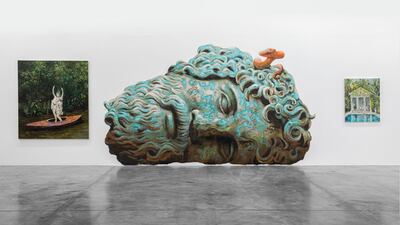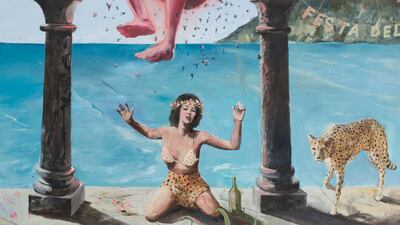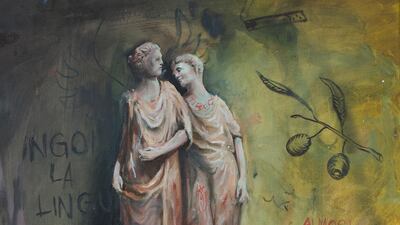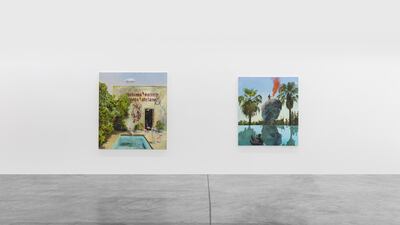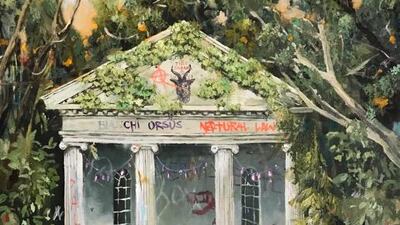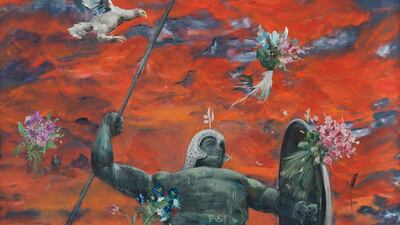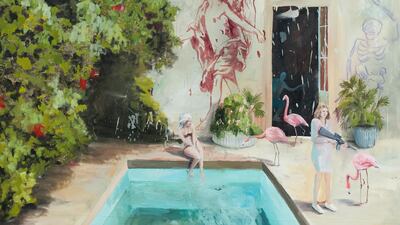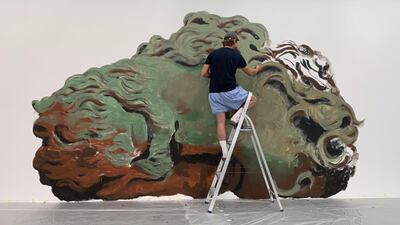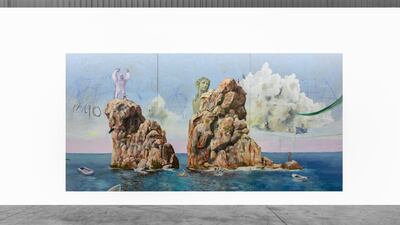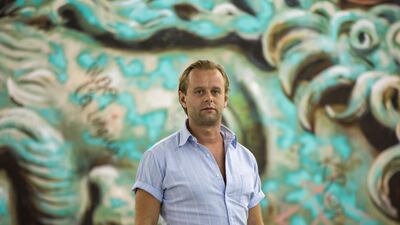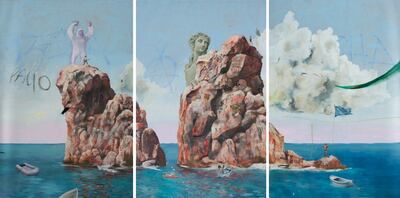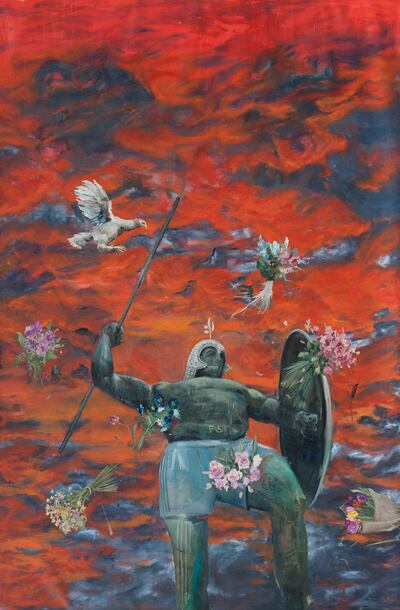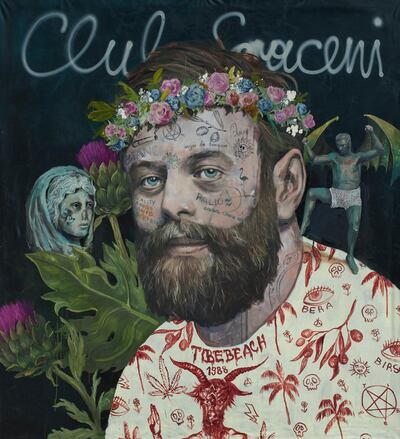It’s the end of a long-raging party. Even in the sunny setting of a beach resort that boasts ultramarine waters, the guests are weary and restless, surrounded by decaying and defiled architecture.
These scenes in Philip Mueller's latest paintings, on view at the exhibition The Last Days of Soft Machine at Dubai's Carbon 12, mark the end of a journey the artist has been tracing for five years. In 2017, the Austrian artist first presented this autobiographical narrative through his Black Flamingo Sad Boys (BFSB) series, which showed a group of characters descending from the Alpine mountains to seek out a utopia. The works depicted a dream-like state filled with dark forest greens where the subjects, some posed like classical works, others wearing superhero costumes, would dwell.
Mueller continued the story in a 2019 series that focused on an invented locale: Beach Resort Tiberio, an island paradise inspired by Capri and the prison island of Santo Stefano. In the paintings, the pristine landscape is taken over by the hedonistic pursuits of his characters, modelled after his own family and friends. Described as an “anti-beach resort” by the artist, the island transforms from a place of relaxation to a site where urges are left untamed as the guests celebrate the end times.
In The Last Days of Soft Machine, the celebrations are at their end. Having laid waste to the island and their bodies, the inhabitants are now defeated by their debauchery. These newest paintings are more vivid than previous ones, with vibrant seas and skies juxtaposed with anarchist slogans scribbled all over the resort’s buildings and rocky cliffs. “It’s brighter – the party got more intense and so the colours did, too,” says the artist.
“The exhibition is another documentation about the last days of the beach resort. It’s filled with people I wish to meet there or to invite there. I guess I started inviting more people and it’s getting more crowded, but the idea is quite the same,” he continues. “Although they’re very free, they’re celebrating the end of the world or the end of anything.”
The paintings signal an undoing of overindulgence: the work Dogdays at Santo Stefano shows a group of people by the pool, with one woman kneeling, as if in pain or resignation, blood trickling down her face and her hands raised to the sky. A woman wearing a flower crown mirrors the same pose in Lunch Ritual at Tibe Beach as an exploding pink body hovers above her. At her feet, is a scattering of flowers – tossed as if she were on stage – and a knife, fish, pack of cigarettes and a crocodile tail.
“If you’re showing parties or [these] situations, the biggest part behind all that is very sad, that our species has come to this point where we create psychological issues. When I’m showing happy party scenes, the bigger part, the untold part, is really heavy,” Mueller says.
Borrowing from classical mythology, Mueller summons the presence of Cronos (also known as Kronos), a force of destruction and chaos. The towering deity is cast against a blood-red sky, a lifted arm carrying a spear as bouquets of flowers are seemingly thrown to him in praise. The artist says that although this shows a “very dark image”, Cronos can also be seen as the harbinger of great change, as the “god of time and of mending” to “smash the control machine”.
Another striking work in the show is the mural of Asclepius, the god of medicine. His head is turned sideways, rendered in mossy greens and electric blues just like the resort’s pools. Completed on-site over the course of a week, the work will be painted over when the next exhibition comes along. Mueller doesn’t mind this, and says it suits his theme of Russian Decadence quite well. “Build something up, tear it down and don’t feel sorry about it. So you let something go,” he says.
The three series so far have been largely autobiographical, painting a kind of psychological portrait of the artist over the years. For the first time, however, he has included an actual self-portrait in the show. It shows Mueller with a flower crown and graffiti tattooed over his face. On one shoulder rests a demon figure, and over the other is the bust of saint-like woman.
The self-portrait has been in the works for two years. “It was my first self-portrait, so I thought it had to be used for this exhibition … it tends to fit for this particular exhibition because I started the series and I’m ending it now. So it’s all my story,” he says.
Outside of their autobiographical origins, Mueller's apocalyptic scenes resonate deeply in the present, where world order seems to be tipping. In a way, he pre-figured the ending when he first introduced Beach Resort Tiberio last year. When he exhibited the works, he painted a large mural of the Capitoline Wolf, with Romulus and Remus suckling beneath her. Much like Rome, the exploit was fated for a fall. Seeing the hedonism and wild rapture in Mueller's paintings, there is a sense that this type of freedom equates the unbridling of the death drive, though not necessarily in the bodily, physical sense. Rather, it is the purging of demons to start again.
Even now, the artist says that though he might be saying farewell to the excess and the islands, the guests will live on. The story remains mirrored in his own life – he recently moved to the mountains, south of Austria. “I’m looking forward to diving in those sceneries again,” he says. It seems the characters will follow.
The Last Days of Soft Machine is on view at Carbon 12, Dubai, until Wednesday, November 4
